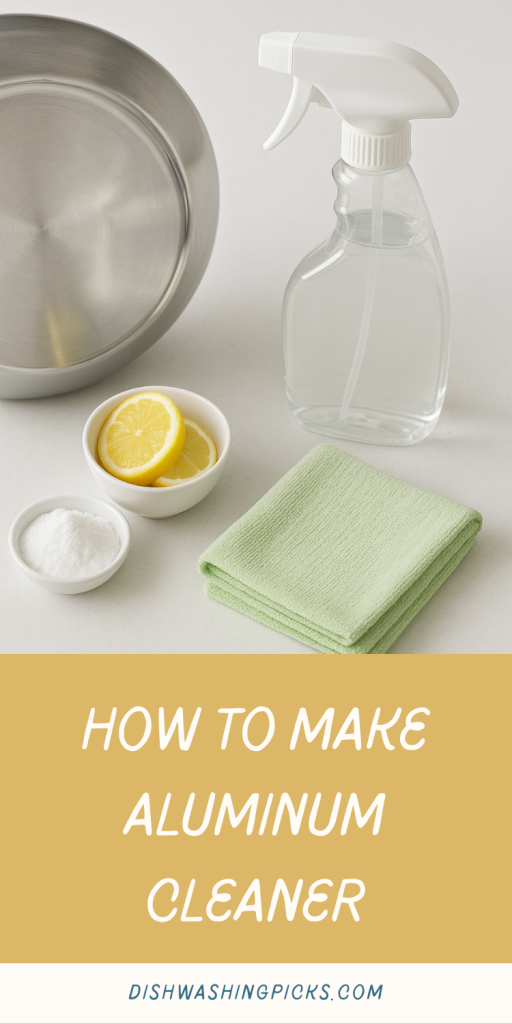
From Dull to Dazzling
You know that moment when you pull out an old aluminum pan, bike rim, or maybe a patio chair, and instead of that shiny silver look, you’re staring at something dull, gray, and a little sad? Yeah… aluminum has a way of losing its sparkle over time.
But here’s the thing—it doesn’t mean your item is ruined. Aluminum naturally builds up oxidation, which is just a fancy word for the chalky coating that dulls its shine. The good news? You don’t need to spend big bucks on store-bought products. With a few everyday items, you can mix up your own aluminum cleaner right at home.
So, ready to turn back the clock on your cookware or outdoor furniture? Let’s see what you’ll need.
What You’ll Need (No Fancy Chemicals Required)
The beauty of making your own aluminum cleaner is that most of the ingredients are already sitting in your kitchen. Here’s your short and sweet supply list:
- Vinegar or lemon juice – Both are acidic, perfect for cutting through oxidation.
- Baking soda – Gentle but effective scrubber that won’t scratch aluminum.
- Mild dish soap – Great for everyday grease and dirt.
- Water – Warm water works best.
- Soft cloths or sponges – Avoid steel wool—it’ll scratch the surface.
- Optional: Cream of tartar, another pantry staple that works wonders on aluminum stains.
Imagine lining these up on your counter—you’re basically creating a mini cleaning lab, no lab coat required.
DIY Recipes That Actually Work
Alright, here comes the fun part: mixing up your own aluminum cleaner. Depending on what you’re tackling, you can pick one of these methods:
- The Everyday Cleaner
- Mix a few drops of dish soap with warm water.
- Dip in a soft cloth and wipe down your aluminum surface.
- Rinse and dry thoroughly to prevent water spots.
- Mix a few drops of dish soap with warm water.
- Great for quick wipe-downs on pots, pans, and utensils.
- The Baking Soda Paste
- Combine 3 parts baking soda with 1 part water to make a paste.
- Rub gently onto the aluminum using a cloth or sponge.
- Rinse off and buff dry.
- Combine 3 parts baking soda with 1 part water to make a paste.
- Perfect for stubborn spots without scratching.
- The Vinegar (or Lemon) Soak
- For cookware: boil equal parts vinegar (or lemon juice) and water.
- Drop in the aluminum piece for a few minutes.
- Rinse well and dry.
- For cookware: boil equal parts vinegar (or lemon juice) and water.
- Works like magic on discolored pots and pans.
- The Cream of Tartar Trick
- Mix 2 tablespoons of cream of tartar in a quart of hot water.
- Apply to your aluminum surface, let it sit a few minutes, then rinse.
- Mix 2 tablespoons of cream of tartar in a quart of hot water.
- Old-school, but super effective for restoring shine.
Where to Use It (and Where Not To)
So, here’s the question you might be asking: “Can I just use these on any aluminum surface?” Well, almost.
Great for:
- Cookware (pots, pans, baking sheets)
- Bike parts and car wheels
- Outdoor furniture
- Kitchen utensils
Avoid on:
- Nonstick-coated aluminum pans (you might damage the coating)
- Aluminum electronics casings (stick to microfiber and mild cleaners)
Think of these methods as best for raw, exposed aluminum—not delicate coatings.
Pro Tips for the Best Results
Let’s be real—cleaning aluminum isn’t just about scrubbing harder. It’s about cleaning smarter. A few quick tips:
- Always dry aluminum after cleaning to avoid water spots.
- Test your cleaner on a small spot first—better safe than sorry.
- Buff with a dry microfiber cloth for that final shine.
- For outdoor items, consider a protective coat (like car wax) to slow down future oxidation.
Wrapping It Up
So there you have it—your complete guide to making aluminum cleaner at home. With a few pantry staples like vinegar, baking soda, and lemon juice, you can bring dull aluminum back to life without spending a dime on specialty products.
Next time you notice your favorite pan looking tired, or your patio chairs losing their glow, try one of these DIY tricks. Imagine the satisfaction of seeing that shine come back—knowing you did it yourself, with nothing more than a little kitchen chemistry.
